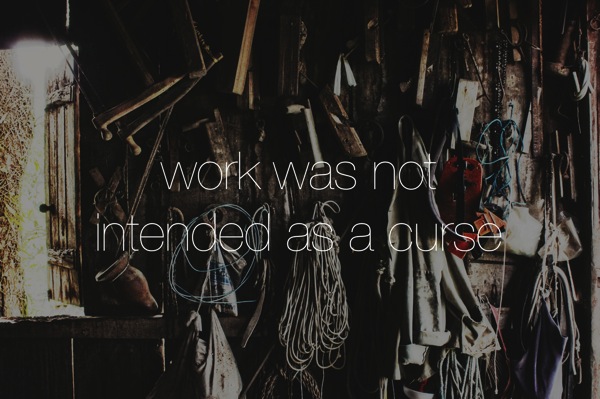 Change often starts in the fringes with an oddball group that doesn’t quite fit with everybody else. It starts with a passion and an idealism that believes things can be better than they currently are.
Change often starts in the fringes with an oddball group that doesn’t quite fit with everybody else. It starts with a passion and an idealism that believes things can be better than they currently are.
The Reformation began with a theological misfit on the fringes who believed that the Church had drifted away from the Gospel. Martin Luther began a movement with passion and idealism that believed the Church could actually be reformed. He was crazy enough to believe that the Gospel was not about works but about grace. And he was crazy enough to believe that it wasn’t just the priests that did sacred work, but all believers.
We are in a day that needs these kind of crazy reformers. We need a group of crazy ones who are crazy enough to believe that the Gospel still does its work. We need a group of crazy ones who are crazy enough to believe that God calls everyone of us to bring the Gospel into our communities the context of our ordinary, everyday lives.
We need a movement of reformers who believe that things can be better than the way they currently are. The crazy ones who actually believe that because of the Gospel, we are freed to love our neighbor with no strings attached. A group that embraces vocation; an understanding that God is hidden in us doing his work in the world as we serve our neighbors in our homes, our communities, and our churches.
If we want things to be the way they currently are, we should keep doing exactly what we are currently doing. But if we want things in our world and in the Church to be different, something must change.
Steve Jobs once said,
“Here's to the crazy ones. The misfits. The rebels. The troublemakers. The round pegs in the square holes. The ones who see things differently. They're not fond of rules. And they have no respect for the status quo. You can quote them, disagree with them, glorify or vilify them. About the only thing you can't do is ignore them. Because they change things. They push the human race forward. And while some may see them as the crazy ones, we see genius. Because the people who are crazy enough to think they can change the world, are the ones who do.”
What would happen if a group of misfits, rebels and round pegs aligned around a desire to bring us back to the pure Gospel? What would happen if a group of reformers got together and pushed forward into this new day and culture with the message that has been handed down to us from the scriptures?
The Modern Reformation
The Crazy Ones go backwards.
The crazy ones in today’s world will be the ones that go back.
They will be the ones that go back to an ancient truth and believe that this ancient text is a message of hope for all the world. In a world that is quick to throw out the Word, we need a recovery and love for the Word. In Churches that are quick to throw out grace for a list of dos and don'ts, we need a recovery of the Gospel that says “done.” And in our Churches, that have ignored the doctrine of vocation, we need a recovery of the understanding that God calls all of us to our homes, neighborhoods, churches, and workplaces to serve our neighbor and share the Gospel.
The crazy ones won’t be the ones that are saying something new, but they will be the ones that are saying ancient truths in new ways.
The Crazy Ones go forward.
Not only do the reformers go back, but they go forward.
In order for the first Reformation to take place, it was largely shaped by the technology of the day. It was shaped by the printing press. Today, the changes (both good and bad) that take place in the Church are shaped by the new printing press - it is shaped by blogs and podcasts and social media.
The Reformation brought the ancient truth of God to the people of the cities in a language they could understand. In our day as we recover what has often been lost in broader Christianity and in our culture, we will need to bring the message of the Gospel in the language of the people.
We will need to translate God’s word into the language of people we want to reach. The way we sound and how it looks when we talk might change, but the message stays the same. When Luther introduced the Reformation, people fought against it. They feared his radical ideas like giving the Word to ordinary people or introducing music into the Mass.
But whatever Luther did, he did because he was crazy enough to believe that it actually served the message of the Gospel.
https://www.youtube.com/watch?v=8rwsuXHA7RA
The Gospel is the message of the Reformation. And it will be the message of the new Reformation. Perhaps it’s crazy to believe that this ancient message is the message that our world needs today? Maybe it’s crazy to think that the message that God can use ordinary people like us to be the mouthpiece of God in this world.
And maybe it’s crazy to think that a story about a guy who was given the death penalty for his scandalous message of grace is the hope the world needs. Paul himself said it’s a little bit crazy in 1 Corinthians 1:18 when he wrote, "For the message of the cross is foolishness to those who are perishing, but to us who are being saved it is the power of God."
So for my fellow crazy ones, in the words of Steve Jobs, “Stay hungry. Stay foolish.”

 Two men. Two different jobs. Two different offerings. The story of Cain and Abel is the story of the first dysfunctional family; two brothers come before God making offerings and find God responding in two very different ways.
Two men. Two different jobs. Two different offerings. The story of Cain and Abel is the story of the first dysfunctional family; two brothers come before God making offerings and find God responding in two very different ways. I have officially completed my first year of seminary. Last fall, I officially jumped head first into this new journey of having my nights filled with writing papers, listening to lectures, and reading books by dead guys. And now, after one year of hard work, I’m still at it.
I have officially completed my first year of seminary. Last fall, I officially jumped head first into this new journey of having my nights filled with writing papers, listening to lectures, and reading books by dead guys. And now, after one year of hard work, I’m still at it. If you listen to the radio for a while, you’ll probably notice that every song kind of sounds the same. Or if you watch movies, you’ll often start to notice how frequently movies are just re-makes of something else. And even the original movies still all use the same basic story structures, such as
If you listen to the radio for a while, you’ll probably notice that every song kind of sounds the same. Or if you watch movies, you’ll often start to notice how frequently movies are just re-makes of something else. And even the original movies still all use the same basic story structures, such as  Tacos are awesome. A great deal on a new pair of shoes is awesome. Blog posts are awesome. Saving money on your car insurance, awesome. I recently watched a
Tacos are awesome. A great deal on a new pair of shoes is awesome. Blog posts are awesome. Saving money on your car insurance, awesome. I recently watched a 
 Do you ever have one of those days? Those days were work just seems to drag on. The day where the TPS reports are killing you and your sick of being told you have a “case of the mondays.” I’m not sure there is such a thing as a job where you don’t have those days.
Do you ever have one of those days? Those days were work just seems to drag on. The day where the TPS reports are killing you and your sick of being told you have a “case of the mondays.” I’m not sure there is such a thing as a job where you don’t have those days. [This post is a part of
[This post is a part of  [This post is a part of the
[This post is a part of the  [This post is a part of
[This post is a part of  [This post is a part of the
[This post is a part of the  This week I’m hanging out with some awesome people at the
This week I’m hanging out with some awesome people at the  Every week, I start out my work by creating a checklist. I live and die by the checklist; without it I am pretty sure I wouldn't get anything done. A lot of us also operate our lives around our checklists. And not only do we use these lists to guide our decision-making, but many of us rely on our checklists to be our source of worth and validation.
Every week, I start out my work by creating a checklist. I live and die by the checklist; without it I am pretty sure I wouldn't get anything done. A lot of us also operate our lives around our checklists. And not only do we use these lists to guide our decision-making, but many of us rely on our checklists to be our source of worth and validation.